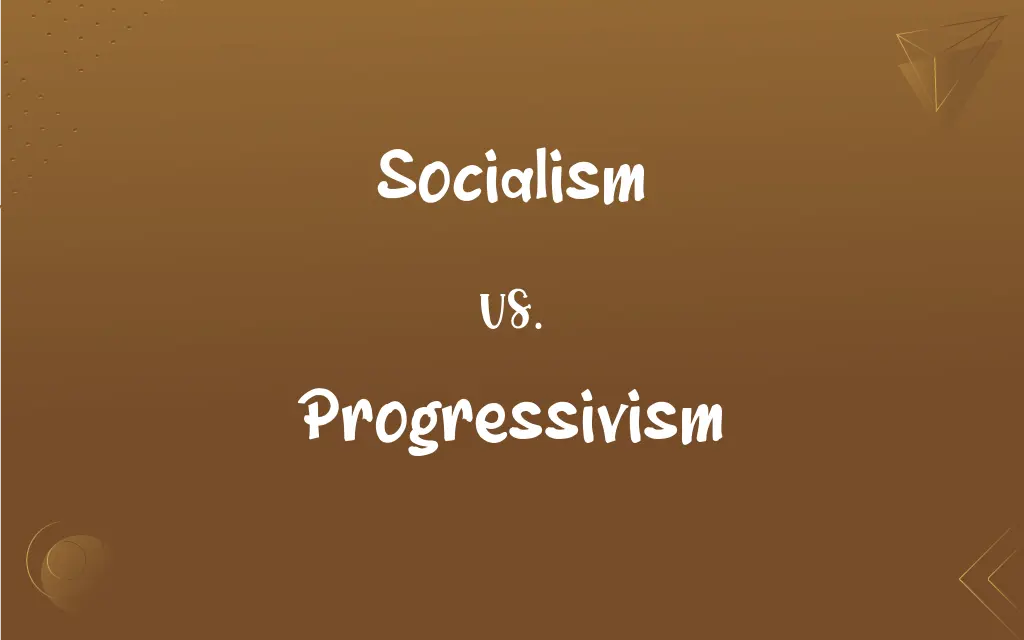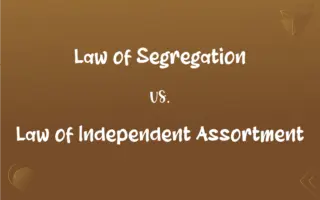Socialism vs. Progressivism: What's the Difference?
Edited by Aimie Carlson || By Harlon Moss || Published on December 18, 2023
Socialism is an economic system where the community owns production means, while progressivism focuses on social reform for equality and justice.

Key Differences
Socialism is an economic and political system where the means of production, distribution, and exchange are owned or regulated by the community as a whole. This system emphasizes reducing class distinctions and aims for a more equitable distribution of wealth and resources. Progressivism, however, is more of a social and political movement that seeks to bring about social reform. It focuses on addressing issues like inequality, corruption, and the need for progressive social policies.
The core principle of socialism revolves around collective ownership and control, often by the state, of resources and production. This approach can manifest in various forms, from democratic socialism to more authoritarian versions, but the common goal is to reduce the disparities caused by capitalism. Progressivism does not inherently oppose capitalism; instead, it seeks to improve and reform the system through progressive policies, advocacy for civil liberties, and social justice.
Socialism often advocates for the redistribution of wealth through mechanisms like high taxes on the wealthy and increased government spending on social services. This approach is seen as a way to level the playing field and ensure basic needs are met for all. Progressivism, while it may support similar policies, is broader in scope. It includes efforts to address a range of social issues such as environmental protection, gender equality, and racial justice.
In socialism, the government plays a significant role in economic planning and decision-making, which can lead to a more centralized control over society. This can be contrasted with progressivism, where there is a focus on grassroots activism, democratic participation, and changing societal norms and policies from the bottom up. Progressive movements often emphasize the importance of individual and minority rights within the broader social framework.
Socialism often involves significant changes or overhauls to existing economic systems, while progressivism typically works within the existing political and economic frameworks to enact change. Socialism can be seen as a blueprint for an alternative economic system, whereas progressivism is more about reforming and improving the current system through social and political change.
ADVERTISEMENT
Comparison Chart
Primary Focus
Economic system, collective ownership
Social reform, equality, justice
Approach to Economy
Community or state control of production
Works within capitalist framework
Government's Role
Central in planning and control
Regulatory, supportive of reforms
Key Principles
Redistribution of wealth, equality
Grassroots activism, social justice
Scope
Economic restructuring
Broad social and political reform
ADVERTISEMENT
Socialism and Progressivism Definitions
Socialism
It's a political theory advocating for collective control over production and resources.
Socialism proposes equal distribution of wealth to ensure everyone's basic needs are met.
Progressivism
It focuses on addressing social issues like inequality, environmental protection, and rights.
Progressivism drives many modern environmental and civil rights movements.
Socialism
Socialism is an economic system where production and distribution are collectively owned.
Under socialism, the state might own key industries like transportation and healthcare.
Progressivism
Progressivism is a social and political movement advocating for reforms and social justice.
The progressivism era saw significant reforms in labor laws and women's suffrage.
Socialism
Socialism emphasizes reducing class disparities and equitable resource distribution.
In socialism, the government plays a key role in redistributing income through social programs.
Progressivism
Progressivism works within the existing system to advocate for equality and justice.
Progressive movements have been instrumental in advancing LGBTQ+ rights.
Socialism
This system seeks to replace or reform capitalism with collective ownership.
Countries with socialist policies often have extensive public welfare systems.
Progressivism
This movement emphasizes grassroots activism and democratic participation.
Progressivism encourages community involvement in policy-making processes.
Socialism
Socialism involves community-driven management of economic activities.
Socialism advocates for worker control over factories and industries.
Progressivism
Progressivism seeks to improve society through progressive policies and social change.
Under progressivism, there’s a push for more inclusive healthcare and education policies.
Socialism
Any of various theories or systems of social organization in which the means of producing and distributing goods is owned collectively or by a centralized government that often plans and controls the economy.
Progressivism
The principles and practices of political progressives.
Socialism
The stage in Marxist-Leninist theory intermediate between capitalism and communism, in which the means of production are collectively owned but a completely classless society has not yet been achieved.
Progressivism
Progressive education.
Progressivism
A political ideology that favours progress towards better conditions in society.
Progressivism
The political orientation of those who favor progress toward better conditions in government and society
FAQs
How do socialism and progressivism differ in economic approach?
Socialism seeks collective ownership of production, while progressivism often works within a capitalist framework.
What is progressivism?
Progressivism is a social and political movement focusing on reforming society for greater equality and justice.
What are the goals of socialism?
Socialism aims to reduce class disparities and redistribute wealth more equitably.
What does progressivism focus on?
Progressivism focuses on social reform, addressing issues like inequality, environmental protection, and civil rights.
What is socialism?
Socialism is an economic and political system advocating for collective ownership and equitable wealth distribution.
Can socialism and progressivism coexist?
Yes, they can coexist, as some socialist policies may align with progressive goals.
What role does activism play in progressivism?
Grassroots activism and democratic participation are central to progressivism.
How do progressives view social justice?
Progressives view social justice as a key goal, striving for a more equitable society.
Do socialism and progressivism have different historical roots?
Yes, socialism and progressivism have different historical roots but sometimes overlap in goals and ideals.
Is socialism more economic or political?
Socialism is both economic and political, involving systemic changes to both spheres.
Are progressive movements always successful?
While not always successful, progressive movements often bring significant social changes.
How does socialism view the role of government?
Socialism often sees a strong government role in economic planning and control.
Is socialism against capitalism?
Socialism often seeks to replace or significantly reform capitalist systems.
How does socialism address wealth inequality?
Socialism addresses wealth inequality through redistribution and public ownership.
How do socialists view private property?
Socialists often advocate for collective or public ownership over private property.
Can a socialist system be democratic?
Yes, there are forms of democratic socialism that combine collective ownership with democratic governance.
Does progressivism support capitalism?
Progressivism can support capitalism but advocates for reforms to address its shortcomings.
Can a capitalist society be progressive?
Yes, a capitalist society can adopt progressive policies and reforms.
Can progressivism lead to socialism?
Some progressive movements may advocate for socialist principles, but not all do.
What are common progressive policies?
Common progressive policies include universal healthcare, environmental regulations, and social welfare programs.
About Author
Written by
Harlon MossHarlon is a seasoned quality moderator and accomplished content writer for Difference Wiki. An alumnus of the prestigious University of California, he earned his degree in Computer Science. Leveraging his academic background, Harlon brings a meticulous and informed perspective to his work, ensuring content accuracy and excellence.
Edited by
Aimie CarlsonAimie Carlson, holding a master's degree in English literature, is a fervent English language enthusiast. She lends her writing talents to Difference Wiki, a prominent website that specializes in comparisons, offering readers insightful analyses that both captivate and inform.







































































